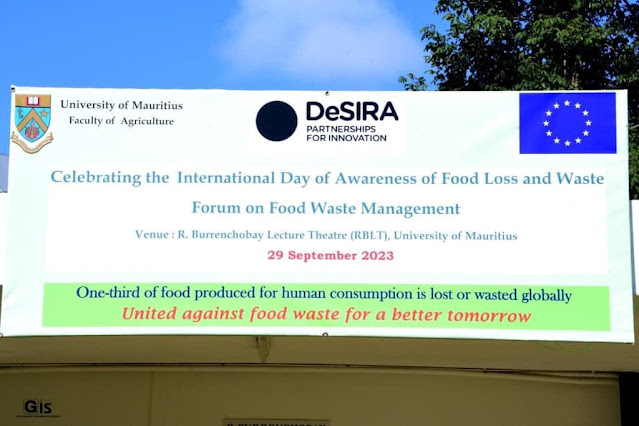 |
| Assoc Prof D. Goburdhun (pictured second from right in the front row) |
A half-day activity under the theme ‘Tackling
Overconsumption’ in the context of World Home Economics Day 2025, was
organised, by the Home Economics Unit of the Ministry of Gender Equality and
Family Welfare at the National Women Development Centre, in Phoenix.
Associate Professor, Mrs Daya Goburdhun, of the Faculty of Agriculture from the
University of Mauritius delivered a talk on “Mindful Consumption - Reducing
Food Waste at Household Level”.
Based on her presentation slides, here are some of the key lessons that can be drawn:
1. Overconsumption and Food Waste are Major Global Problems: The presentation clearly highlights the enormous scale of waste (food, electronic, etc.) globally and specifically in Mauritius, emphasizing its significant negative impacts on the environment (resource depletion, pollution, climate change), society (hunger paradox), and economy.
2. Household Choices Matter Significantly: While waste happens at various stages, the presentation focuses on the household level, showing that individual and family decisions about buying, storing, preparing, and disposing of food are a major contributor to the overall food waste problem. We have agency in the solution.
3. Mindfulness is Key to Sustainable Consumption: Simply cutting back isn't enough; the presentation advocates for a mindful approach to consumption and eating. This involves reflecting on needs, evaluating consequences, making intentional choices, and adopting sustainable practices. It's about being conscious and deliberate in our habits.
4. Reducing Food Waste Requires Practical Actions: The "Nine Easy Tips" provide concrete, actionable strategies that households can implement immediately. These cover the entire lifecycle of food in the home, from planning and shopping to storage, utilization, and dealing with unavoidable scraps.
5. We Should Value Imperfect Food: The presentation challenges the cosmetic standards that lead to the rejection of perfectly edible but 'ugly' produce. It teaches that these items are just as nutritious and can be used creatively, often at a lower cost.
6. Understanding Food Labels is Crucial: Differentiating between "Expiry Date" (safety) and "Best Before" (quality) helps prevent discarding food that is still safe to eat, addressing a significant source of waste.
7. Proper Storage and Planning Prevent Spoilage: Techniques like practicing FIFO (First In, First Out), understanding optimal storage conditions (fridge temperature, container use), and checking existing inventory before shopping are essential for extending food life and avoiding waste.
8. Waste Can Be Resource: The presentation shows that food scraps can be transformed into valuable resources like compost, reducing landfill waste and providing benefits for soil. Sharing edible surplus food is another way to prevent waste and support others.
9. Home Economics Plays a Vital Role: The field of Home Economics is positioned as crucial in educating and empowering individuals and families to make the informed, sustainable choices needed to tackle overconsumption and food waste.
In essence, the presentation teaches us that the problem of food waste is huge but also manageable at the individual level through conscious choices and the adoption of practical, mindful strategies throughout our interaction with food.
However, there are some potential obstacles to adopting mindful consumption, as follows:
1. Lack of Awareness and Understanding: Many people may not fully grasp the scale of the problem of overconsumption and food waste, or the environmental, social, and economic consequences. They might not understand why mindful consumption is important beyond personal cost savings.
2. Established Habits and Convenience Culture: Overconsumption and waste are often driven by convenience and deep-seated habits. It takes effort to plan meals, shop mindfully, store food correctly, and utilize leftovers compared to quick, impulsive choices or discarding food.
3. Lack of Knowledge and Skills: Even with awareness, people might lack the practical knowledge or skills needed for mindful consumption. This includes knowing how to plan meals, create shopping lists effectively, understand food date labels, store different foods optimally, cook with leftovers, or compost food scraps.
4. Confusing Information: Date labeling ("Best Before" vs. "Use By") is explicitly mentioned as confusing, leading consumers to discard food prematurely out of safety concerns, even if it's still good.
5. Marketing and Societal Norms: Advertising often encourages buying more, prioritizing novelty, and linking consumption to happiness or status. Societal expectations regarding entertaining guests (providing excess food), or the desire for aesthetically perfect produce can also hinder mindful choices.
6. Economic Factors: While mindful consumption can save money in the long run, perceived upfront costs (e.g., buying good storage containers, initial planning time) or the allure of cheap bulk deals that lead to over-buying can be barriers. Economic disparity can also mean that for some, access to resources for optimal storage or time for careful planning is limited.
7. Time Constraints: Modern busy lifestyles make time-saving options (pre-prepared foods, eating out, quick shopping trips without planning) more appealing, even if they contribute to waste. Planning and execution of mindful consumption strategies require time investment.
8. Lack of Infrastructure and Support: The availability of composting facilities or community initiatives for food sharing/donation can be obstacles in some areas.
9. Psychological Factors: The satisfaction derived from buying ("retail therapy"), the feeling of abundance from having a full fridge/pantry, or the aversion to dealing with less-than-perfect items can make mindful choices difficult.
Overcoming these obstacles requires a combination of increased awareness, education (like presentations such as this one), policy support, improved infrastructure, and a shift in cultural norms towards valuing resources and prioritizing sustainability.













